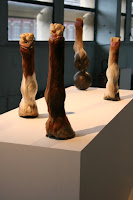Europe XXL- Eastern Europe Festival
Do we have the solidarity within us? I don’t think so. (...) I don’t know what is East Europe now. I know what I can bring to Europe.
Dan Perjovschi
Europe XXL festival was organized by city Lille and Lille 3000 society.
It started on 14th of March with a pageant parade ,and for the next 4 months will be full of artistic events presenting the Eastern Europe culture. This is the opportunity to know something more about this area, to ask some new questions. Visual art is the most interesting part of festival. Important curators and influential artists from the Eastern Europe were invited to take part in this event. Political or social issues are the most popular topics of their works.
At the festival we can see the exhibitions prepared by curators like Iara Boubnova, Elena Sorokina, Filippo Poli, Federico Zanfi, Caroline Naphegyi.
Artists who take part in group exhibitions: Dan Perjovschi, AES+F (Russie), Maja Bajevic (Bosnie/Allemagne), Blue Noses (Russie), Luchezar Boyadjiev (Bulgarie), Pavel Braila (Moldavie), Aristarkh Chernyshev (Russie), Nina Fisher et Maroan El Sani (Allemagne),Vadim Fishkin (Russie/Slovénie), IRWIN (Slovénie),Cristina Lucas (Espagne), Carsten Nicolai (Allemagne), Roman Ondak (Slovaquie), Sean Snyder (USA /Ukraine), Nedko Solakov (Bulgarie), Oleg Kulik (Russie), Deimantas Narkevicius, (Lituanie), Krassimir Terziev (Bulgarie), Clemens von Wedemeyer (Allemagne), Libia Castro et Olafur Olafsson (Espagne, Islande, Pays-Bas), Monika Sosnowska (Pologne), Adrian Paci (Albanie, Italie), Vladimir Nikolic (Serbie), Pierre Bismuth (France) Matteo Ghidoni, Katarzyna Teodorczuk, Daniel Pario Perra, Tobias Zielony, Deniz Gul, Hariklia Hari, Veronika Zapletalovŕ, Isabella Sassi, Xavier Arenňs, Cecilia Pirovano, Federica Verona, Francisca Benětez, Huseyin Alprekin / Raquel Friera, Nůria Guell, Sofie Thorsen, Bas Princen, Can Altay, Marina Ballo Charmet, Markos Stamenkovic, Luz Mundos, Tadej Pogacar, Banu Cennetoglu, Manuela Schininŕ, Paloma Merchan Taribo, Theoharis David, Veronika Zapletalova, Dennis Gul, Laura Marte, Danica Dakic, Sejla Kameric, Erbossyn Meldibekov, Milica Tomic, Igor Grubic, Djamshed Kholikov, Sophia Tabatadze, Stealth.unlimited (Ana Dzokic and Marc Neelen), Abilsait Atabekov, Gulnara Kasmalieva/Muratbek Djoumaliev, David Maljkovic, Marjetica Potrc, Igor Eskinja, Christoph Weber, Alexander Ugay, Elena Kovylina, Chto Delat Group (Olga Egorova Tsaplya), Dmitry Vilensky, Natalia Pershina (Gliuklya), Nikolai Oleinikov, Huseyin Bahri Alptekin, Kutlug Ataman, Bashir Borlakov, Osman Bozkurt, Hussein Chalayan, Burak Delier, Koken Ergun, Inci Eviner, Katja Eydel, Deniz Gül, Omer Ali Kazma, Servet Kocyigit, Corey Mc Corkle, Antoine Ignace Melling, Aydan Murtezaoglu, Ceren Oykut, Serkan Ozkaya, Sener Ozmen et Erkan Ozgen, Camila Rocha, Sarkis, Erinç Seymen, Hale Tenger, Pinar Yolaçan et Aksel Zeydan.
The Krasnals represent Poland with an individual exhibition:„Brothers In Arms/Last Supper” in Espace le Carre (from 13th March till 30th April).
On a later date, will be a group exhibition from Poland organized by Zamek Ujazdowski. Curators:Stach Szabałowski and Marcin Krasny. Artists: Olaf Brzeski, Grzegorz Drozd, Tomasz Mróz, Twožywo, Jan Smaga, Jadwiga Sawicka, Marek Kijewski, Wojciech Bakowski, Artur Malewski, Tomek Kowalski, Norman Leto, Konrad Smoleński, Tomasz Kozak, Radek Szlaga, Laura Pawela.
For The Krasnals- part of the answers for a question: "What is Eastern Europe now?"
Iara Boubnova: „There is not such a thing like culture and art of Eastern Europe. Eastern Europe itself is artificial, bureaucratic, administrative nomination of something in between geography, history, and politics. It’s not so much about people, it’s not so much about us, and not so much about culture.”
Dan Perjovschi: “Geography for me is tricky. The Russians are gone! Twenty years later it’s another planet! (…)Do we have the solidarity within us? I don’t think so. (...) I don’t know what is East Europe now. I know what I can bring to Europe. (…) I was in the cooperative system, they forced me to work together. Now I want to be alone! But I don’t address [my art] to myself, I address it to everybody.”
IRWIN: “We started in 92’. That time one of the main reasons what we did was that we wanted to have our own country and artistic autonomy. But during these years situation changed a lot. (…) We are living in the conditions we are put in”
Nedko Solakov: “We need Utopias in terms we need to hope for a kind of a better life.”
Lachezar Boyadjiev: “The West was just as affected by the fall of Berlin wall as the East. In the West it was more like a psychological transformation, whereas in the East it was the transformation of the whole society, economy, political structures and so on.”
As The Krasnals we consider history as an important and influential but we want to create future ourselves, start a new age of art. Project "Brothers in Arms / Last Supper" is our farewell with the history and because of that we can focus on a new problems of reality, reality which create new vision of art.
Thierry Lesueur- main coordinator of initiating committee Lille 3000:
"We present artists from Moscow, Kazakhstan, but the centre of our interest is Istanbul. It made us ask the question about Europe borders , and change view of Europe itself which most of French people have. The artists who came to Lille from many different countries have got a new point of view on European issues. It can be quite surprising for us, and the beginning of international debate about European space. Turkish issue is one of most discussed topics in France. We hope that Europe in size XXL will help us to ask questions what is Europe now, where are borders, who is part of it, and who is not. If today in the time of crisis our way of life can still be the same? We will try to find answers for this questions within next 4 months."
Based on artists works and curators visions we can get an impression that Eastern Europe is rather an artificial expression. It treat more about geographic area then common tradition and culture. After the end of communism artists became individualists, and the countries are no longer community.
Subscribe to:
Post Comments (Atom)














































No comments:
Post a Comment